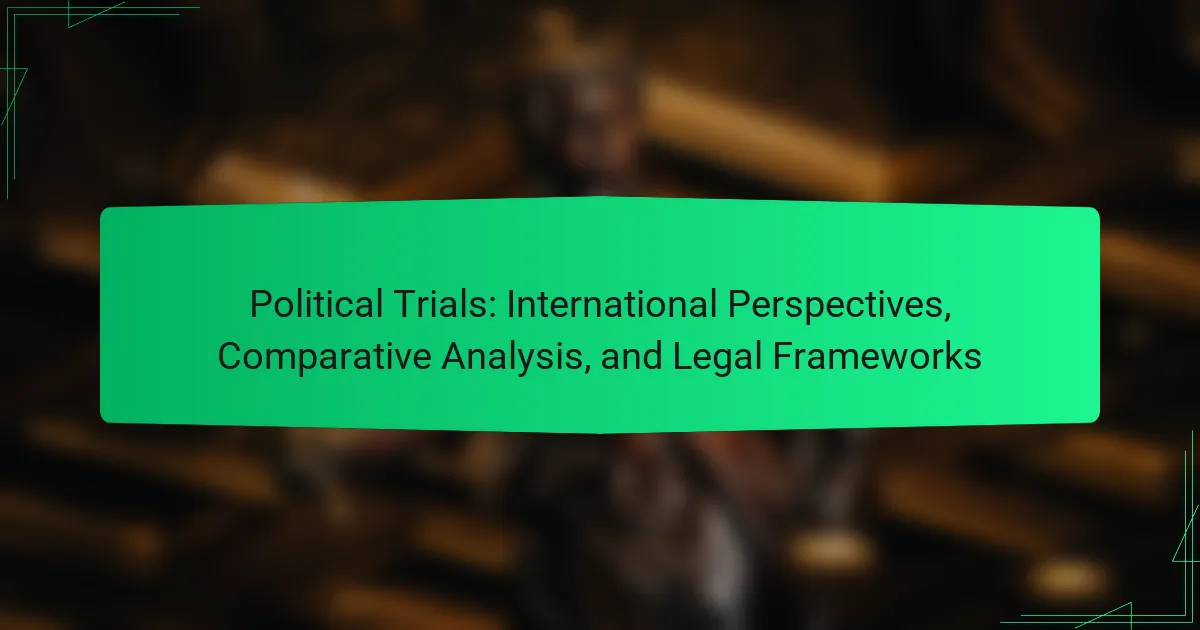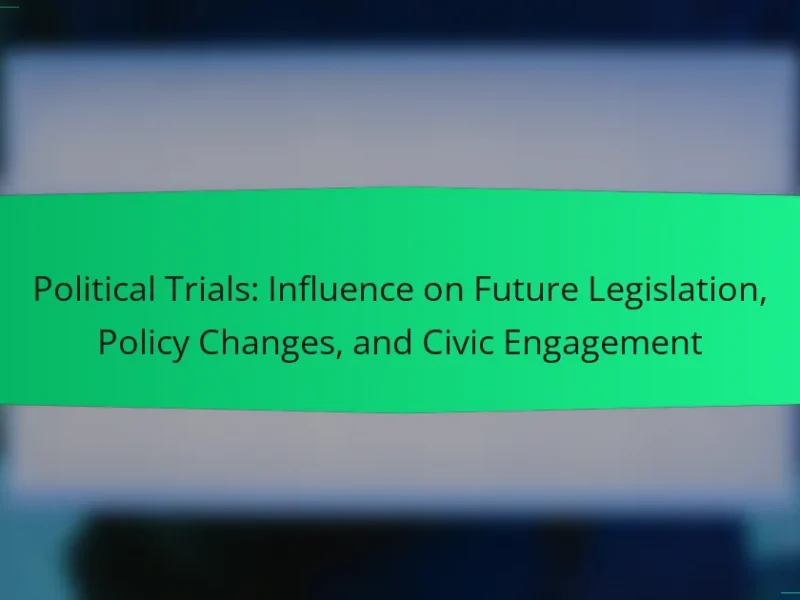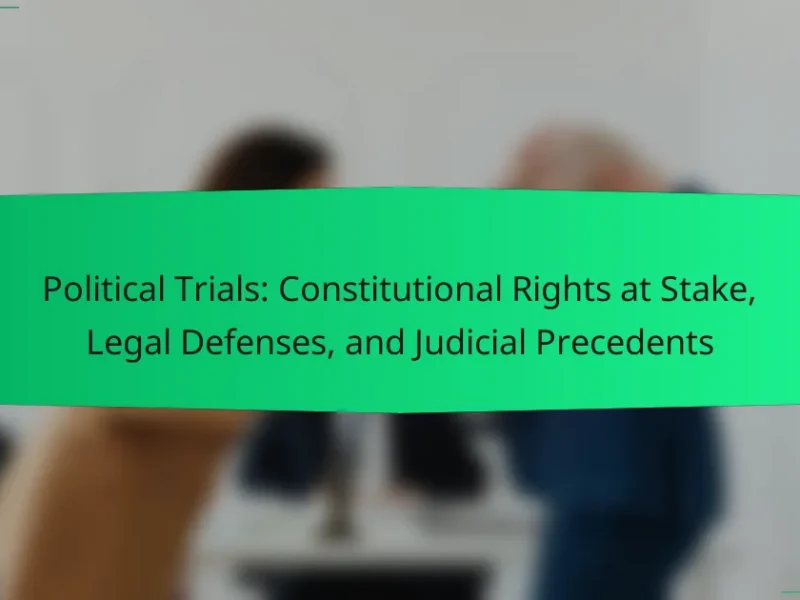Political trials are judicial proceedings involving political figures or issues, often addressing allegations of misconduct, corruption, or abuse of power. These trials significantly influence public trust in the legal system and impact the political landscape and governance. The article explores the variation of political trials across different countries, highlighting the influence of legal systems, political contexts, and cultural norms on their conduct. It examines historical examples, such as the Nuremberg Trials, and discusses the challenges and controversies surrounding political trials, including bias, political motivation, and the implications for justice and accountability. Additionally, the article addresses the role of international human rights frameworks in shaping the standards of these trials.

What are Political Trials and Why Do They Matter?
Political trials are judicial proceedings that involve political figures or issues. They often address allegations of misconduct, corruption, or abuse of power. Political trials matter because they can influence public trust in the legal system. They also impact the political landscape and governance. Historical examples include the Nuremberg Trials after World War II. These trials held leaders accountable for war crimes and established legal precedents. Political trials can also serve as tools for political repression or manipulation. They can shape international relations and human rights discussions. Overall, political trials are significant for their legal, social, and political implications.
How are Political Trials Defined in Different Contexts?
Political trials are judicial proceedings that involve government officials or political figures, often charged with crimes related to their political actions. In democratic contexts, political trials may aim to uphold accountability and the rule of law. For instance, trials against corrupt politicians serve to reinforce public trust in governance. In authoritarian regimes, political trials often function as tools for repression. They may target dissenters or opposition leaders to maintain control. Historical examples include the show trials in Stalinist Russia, which were designed to eliminate political rivals. Different legal frameworks influence how political trials are conducted. In some countries, specific laws govern the prosecution of political figures, while others may lack such regulations. The context significantly shapes the perception and implications of political trials.
What distinguishes a Political Trial from other types of trials?
A Political Trial is distinguished from other types of trials primarily by its focus on political issues and implications. These trials often involve state actors or politically motivated charges. Unlike criminal trials, which focus on individual wrongdoing, Political Trials address broader societal or governmental concerns. They may serve to suppress dissent or reinforce political power. Historical examples include the trials of political dissidents in authoritarian regimes. Such trials often lack impartiality and can be influenced by political agendas. This makes them unique in their purpose and execution compared to standard judicial proceedings.
What are the key characteristics of Political Trials?
Political trials are characterized by their focus on political issues rather than criminal acts. They often involve defendants who are political figures or activists. These trials frequently occur in authoritarian regimes where the judiciary is not independent. Political trials may lack transparency and due process. They often serve to suppress dissent and maintain political control. Evidence presented in these trials can be manipulated or fabricated. The outcomes are typically predetermined to achieve specific political goals. Historical examples include the show trials in Stalinist Russia, which illustrate these characteristics.
What Historical Events Have Shaped Political Trials Globally?
Historical events that have shaped political trials globally include the Nuremberg Trials, the Watergate Scandal, and the Rwandan Genocide Tribunal. The Nuremberg Trials established accountability for war crimes after World War II. They set a precedent for international law and human rights. The Watergate Scandal led to significant legal reforms in the United States. It highlighted the importance of checks and balances in government. The Rwandan Genocide Tribunal addressed crimes against humanity in the 1994 genocide. This tribunal emphasized the role of international justice in post-conflict recovery. Each of these events influenced legal frameworks and the public’s perception of political trials. They also contributed to evolving standards for due process and fair trial rights.
How did the Nuremberg Trials influence modern Political Trials?
The Nuremberg Trials established a precedent for holding individuals accountable for war crimes and crimes against humanity. They introduced the principle that state leaders could be prosecuted for their actions during conflicts. This concept has influenced modern political trials by emphasizing individual responsibility over state sovereignty. The trials also highlighted the importance of legal standards in international law. The establishment of the International Criminal Court drew inspiration from the Nuremberg framework. Furthermore, the trials demonstrated the role of evidence and due process in legal proceedings. They set a benchmark for transparency and fairness in political trials globally. Overall, the Nuremberg Trials significantly shaped the legal landscape for prosecuting political leaders.
What role did the trials of the Khmer Rouge play in international law?
The trials of the Khmer Rouge significantly influenced international law by establishing precedents for prosecuting crimes against humanity. These trials, conducted by the Extraordinary Chambers in the Courts of Cambodia, were among the first to address genocide in a modern legal context. They highlighted the importance of accountability for state-sponsored atrocities. The proceedings emphasized the role of international cooperation in enforcing human rights standards. Additionally, they contributed to the development of legal definitions and frameworks surrounding crimes against humanity and genocide. The trials also reinforced the principle of universal jurisdiction, allowing states to prosecute individuals regardless of where the crimes occurred. This impact has been reflected in subsequent international tribunals, such as those for Rwanda and the former Yugoslavia. Overall, the Khmer Rouge trials have played a crucial role in shaping the landscape of international criminal law.
What are the Common Legal Frameworks Governing Political Trials?
Common legal frameworks governing political trials include international human rights law, domestic constitutional law, and international criminal law. International human rights law, such as the International Covenant on Civil and Political Rights (ICCPR), sets standards for fair trial rights. Domestic constitutional law varies by country but often includes provisions for due process and legal representation. International criminal law, exemplified by the Rome Statute of the International Criminal Court, addresses crimes against humanity and war crimes. These frameworks aim to ensure accountability and protect individual rights during politically charged legal proceedings.
How do international law and domestic law intersect in Political Trials?
International law and domestic law intersect in political trials through the application of universal human rights standards. Domestic legal systems often incorporate international treaties and conventions, influencing the prosecution of political crimes. For example, the International Covenant on Civil and Political Rights sets standards for fair trials. Countries that ratify this covenant are obliged to uphold these standards in their legal proceedings. Additionally, international tribunals can provide jurisdiction over political trials when domestic courts fail to act. This interaction ensures accountability for political leaders accused of human rights violations. The overlap enhances the legitimacy of domestic trials by aligning them with international norms.
What are the principles of fair trial rights in Political Trials?
The principles of fair trial rights in political trials include the right to a public hearing, the presumption of innocence, and the right to legal representation. These principles ensure transparency and accountability in legal proceedings. The right to a public hearing prevents secretive trials that could lead to abuses of power. The presumption of innocence means that the accused is considered innocent until proven guilty, protecting individuals from wrongful convictions. The right to legal representation guarantees that defendants have access to qualified counsel to defend their case. These principles are enshrined in international human rights instruments, such as the International Covenant on Civil and Political Rights (ICCPR). Article 14 of the ICCPR specifically outlines these rights, emphasizing their importance in maintaining justice and fairness in trials, particularly in politically sensitive cases.
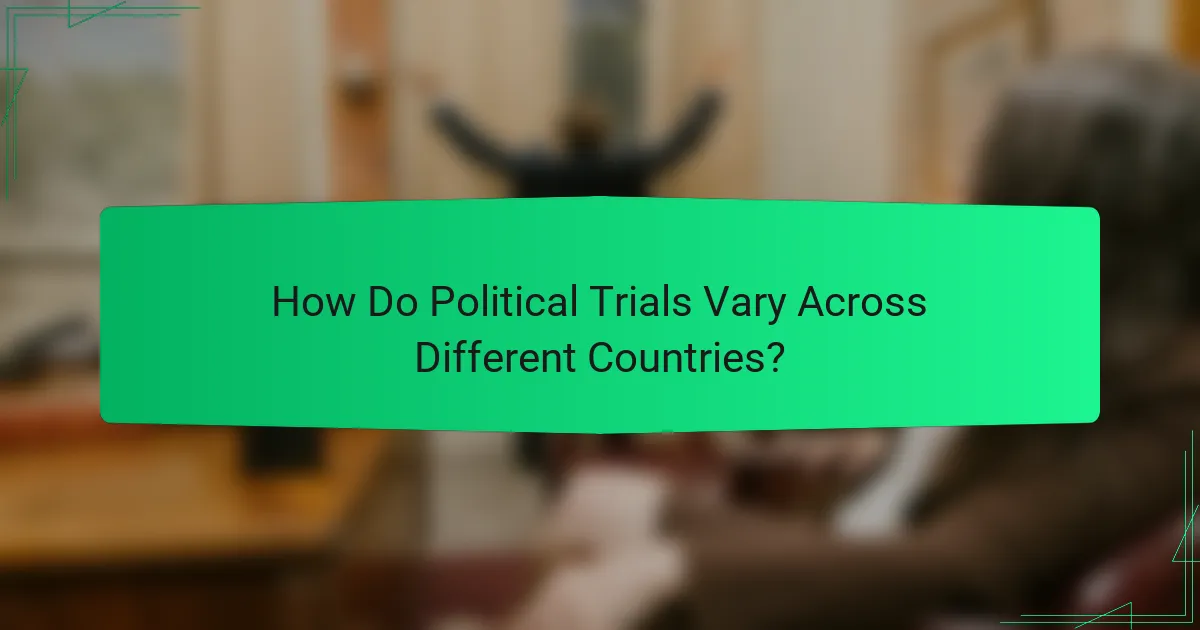
How Do Political Trials Vary Across Different Countries?
Political trials vary significantly across different countries due to differing legal systems, political contexts, and cultural norms. In some nations, political trials are conducted under strict judicial independence, ensuring fair representation and due process. For example, in Germany, political trials are often overseen by impartial judges, reflecting a commitment to rule of law. Conversely, in countries like Turkey, political trials may be heavily influenced by government authority, leading to allegations of unfair practices.
Additionally, the charges brought in political trials can differ widely. In the United States, political trials may involve corruption or abuse of power, while in authoritarian regimes, trials often focus on dissent or opposition to the government. The outcomes of these trials also vary. In democracies, acquittals are more common, whereas in authoritarian states, convictions can be nearly guaranteed.
International human rights frameworks, such as the International Covenant on Civil and Political Rights, influence how political trials are conducted. These frameworks advocate for fair trial standards that some countries adhere to, while others may ignore them. Thus, the variation in political trials reflects a complex interplay of legal principles, political motivations, and cultural attitudes towards justice.
What are the key differences in Political Trial processes in various nations?
Political trial processes differ significantly across nations. In the United States, political trials often involve impeachment procedures initiated by Congress. This process includes investigations and requires a supermajority for conviction. In contrast, countries like Russia have trials that are heavily influenced by the state, often lacking independent judiciary oversight. In many European nations, political trials follow parliamentary systems, where the legislature holds significant power in these cases. Countries with authoritarian regimes may have trials that are politically motivated, lacking transparency and fairness. For instance, in Turkey, political trials have been criticized for targeting dissenters under the guise of national security. Each nation’s legal framework and political context shape these processes, resulting in varied approaches to political trials.
How does the U.S. approach Political Trials compared to Europe?
The U.S. approach to political trials differs significantly from Europe’s. In the U.S., political trials often involve a high degree of media attention and public scrutiny. This can lead to a perception of bias and influence on judicial proceedings. The U.S. legal system prioritizes adversarial proceedings, where each side presents its case vigorously. This contrasts with many European countries, which may employ inquisitorial systems that focus on fact-finding by judges.
In Europe, political trials are often conducted with a greater emphasis on procedural fairness and judicial independence. For example, countries like Germany and France have established legal frameworks that aim to minimize political interference. Additionally, European courts often have mechanisms for appeals that can further safeguard against political motivations.
The differences in approach are reflected in notable cases, such as the impeachment trials in the U.S. versus political corruption cases in European nations. These cases illustrate how cultural and legal traditions shape the handling of political trials.
What unique attributes define Political Trials in authoritarian regimes?
Political trials in authoritarian regimes are characterized by a lack of judicial independence. These trials often serve political purposes rather than legal ones. They typically involve the persecution of opposition figures or dissenters. Evidence presented in these trials is frequently fabricated or manipulated. Legal procedures are often disregarded, undermining the rule of law. Sentences are predetermined, reflecting the regime’s agenda. Public opinion is manipulated through state-controlled media coverage of the trials. These trials often lack transparency and are conducted in secret to avoid scrutiny.
What are the implications of Political Trials on international relations?
Political trials can significantly impact international relations. They often lead to diplomatic tensions between nations. For example, trials perceived as politically motivated may provoke condemnation from foreign governments. This can result in sanctions or withdrawal of diplomatic recognition. Political trials can also influence international public opinion. They may affect a country’s image and soft power. The reactions of international organizations, like the UN, can further complicate relations. Historical instances, such as the trials of political dissidents, illustrate these dynamics. Overall, political trials can reshape alliances and affect global stability.
How do Political Trials affect diplomatic relations between countries?
Political trials can significantly strain diplomatic relations between countries. When a political trial occurs, it often involves allegations against foreign leaders or officials. This can lead to accusations of interference in domestic affairs. Countries may respond with diplomatic protests or sanctions. For example, the trial of former South Korean President Park Geun-hye affected relations with Japan and the United States. Political trials can also result in public outcry and pressure from other nations. Such cases can create divisions within international alliances. Ultimately, the impact on diplomacy varies based on the trial’s context and the countries involved.
What is the impact of Political Trials on human rights advocacy?
Political trials can significantly hinder human rights advocacy. They often serve as tools for governments to suppress dissent. This suppression undermines the credibility of human rights organizations. It creates a chilling effect on activists and advocates. Fear of political repercussions can deter individuals from speaking out. Additionally, political trials may distort legal frameworks. They can prioritize state interests over individual rights. Historical examples, such as the trials during authoritarian regimes, illustrate this impact. In these cases, human rights violations escalated as dissent was criminalized.
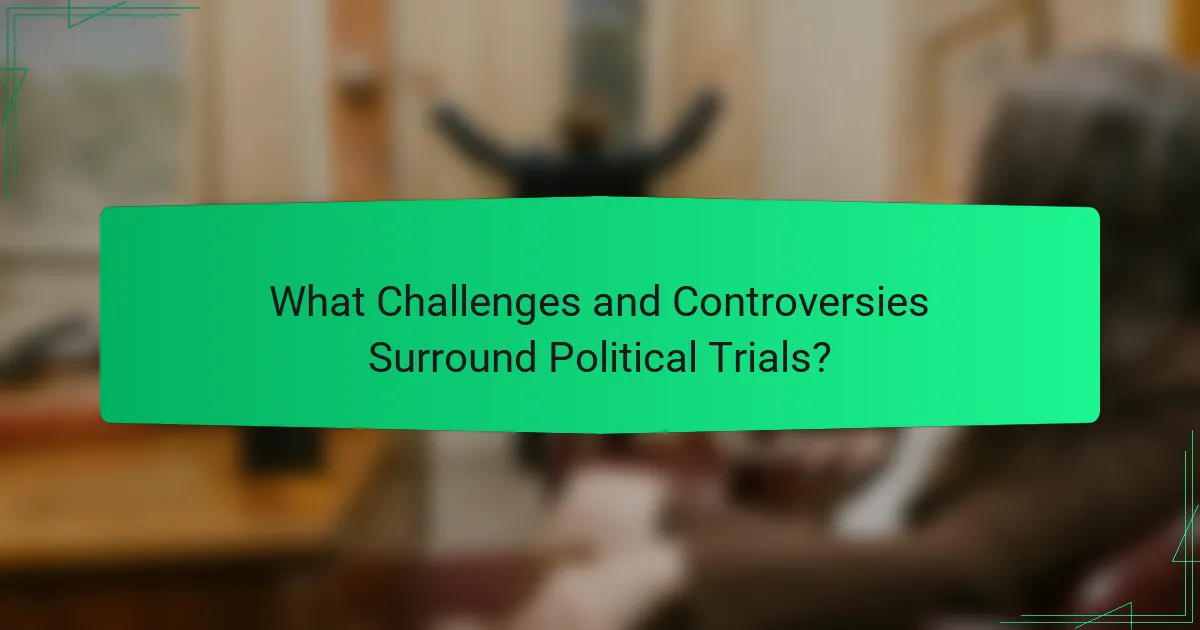
What Challenges and Controversies Surround Political Trials?
Political trials face numerous challenges and controversies. They often involve allegations of bias, undermining the fairness of the legal process. Political motivation can skew judicial outcomes, leading to perceptions of injustice. The use of legal frameworks for political ends raises ethical concerns. Additionally, political trials can polarize public opinion and exacerbate social divisions. Historical examples, such as the trials of political dissidents in authoritarian regimes, illustrate these issues. International responses often critique the legitimacy of such trials, emphasizing the need for impartiality. These challenges complicate the pursuit of justice and accountability in politically charged cases.
What are the most common criticisms of Political Trials?
Political trials face several common criticisms. One major criticism is that they often lack impartiality. Critics argue that political motives can influence judicial outcomes. This undermines the integrity of the legal process. Another criticism is the potential for violation of due process. Defendants may not receive fair trials, impacting their rights. Additionally, political trials can be seen as tools for repression. Governments may use them to silence dissent or opposition. Historical examples, such as the show trials in the Soviet Union, illustrate these concerns. These trials were criticized for being orchestrated to serve political ends rather than justice. Overall, the perception of bias and injustice in political trials raises significant ethical questions.
How does the perception of bias affect the legitimacy of Political Trials?
The perception of bias significantly undermines the legitimacy of political trials. When individuals believe that a trial is biased, they question its fairness and impartiality. This skepticism can lead to public distrust in the judicial system. Historical examples, such as the trials during the McCarthy era, illustrate how perceived bias can delegitimize legal proceedings. In these cases, accusations of political motivations overshadowed the judicial process. Furthermore, studies show that public confidence in legal institutions declines when bias is suspected. This erosion of trust can hinder the effectiveness of legal outcomes. Ultimately, perceived bias challenges the foundational principles of justice and due process in political trials.
What role does media coverage play in shaping public opinion on Political Trials?
Media coverage significantly influences public opinion on political trials. It shapes perceptions by framing narratives and highlighting key details. Coverage can create a sense of urgency or importance around a trial. For example, extensive reporting on high-profile cases can lead to increased public interest and scrutiny. Additionally, media outlets often provide commentary and analysis, which can sway public sentiment. Studies indicate that sensationalized reporting can lead to polarized opinions among the public. Furthermore, the timing and tone of coverage can affect the perceived legitimacy of the trial. Ultimately, media acts as a powerful intermediary between the trial and public perception.
How can countries improve the integrity of Political Trials?
Countries can improve the integrity of political trials by ensuring judicial independence. Independent courts can make unbiased decisions without political influence. Establishing transparent procedures enhances public trust in the judicial system. Adopting international legal standards can provide a framework for fair trials. Training judges and legal professionals on human rights is essential for upholding these standards. Implementing oversight mechanisms can help prevent abuses of power. Countries should also encourage civil society participation in monitoring trials. Historical examples show that reforms lead to better legal outcomes and enhanced public confidence in justice systems.
What best practices can be adopted to ensure fairness and transparency?
Best practices to ensure fairness and transparency in political trials include establishing independent oversight bodies. These bodies monitor trial processes and ensure adherence to legal standards. Implementing clear guidelines for evidence collection is crucial. This ensures that all evidence is gathered lawfully and ethically. Public access to trial proceedings promotes transparency. It allows citizens to observe and evaluate the judicial process. Training judges and legal personnel on impartiality is essential. This helps prevent biases that could affect trial outcomes. Utilizing technology for case management can enhance efficiency. It also allows for better tracking of case progress and documentation. Regular audits of trial processes can identify areas for improvement. These practices collectively foster a judicial environment that upholds fairness and transparency.
How can international cooperation enhance the legal frameworks of Political Trials?
International cooperation can enhance the legal frameworks of political trials by promoting consistency in legal standards. Collaborative efforts between nations can lead to the establishment of shared guidelines for fair trial procedures. This consistency helps to prevent human rights violations during political trials. Additionally, international cooperation can facilitate the exchange of best practices among legal systems. Countries can learn from each other’s experiences in handling political trials. This can improve the overall quality of justice delivered in such cases. Furthermore, joint initiatives can provide resources and training for legal professionals involved in political trials. This strengthens the capacity of national legal systems. By working together, countries can also hold each other accountable for upholding international legal norms. This accountability fosters a culture of respect for human rights and legal integrity in political trials.
What are the Future Trends in Political Trials?
Future trends in political trials include increased use of technology and social media influence. Digital platforms will play a significant role in shaping public opinion during trials. Transparency and accountability are expected to rise as courts adopt online proceedings. International legal standards may become more prominent in domestic political trials. The globalization of legal practices will influence local jurisdictions. Political trials may increasingly reflect societal issues like human rights and corruption. Additionally, there could be a rise in hybrid tribunals combining local and international law. These trends indicate a shift towards more complex and interconnected political legal landscapes.
How might emerging technologies influence the conduct of Political Trials?
Emerging technologies may significantly influence the conduct of political trials by enhancing transparency and accessibility. Digital platforms can facilitate remote participation of witnesses and defendants, improving the efficiency of trial proceedings. Artificial intelligence can assist in analyzing evidence and predicting case outcomes, leading to more informed judicial decisions. Blockchain technology can ensure the integrity of evidence by providing tamper-proof records. Video conferencing tools can allow for real-time communication, reducing delays in trial schedules. Additionally, social media can impact public perception and influence jury pools, potentially affecting trial outcomes. Historical examples, such as the use of video evidence in high-profile trials, demonstrate the potential benefits of these technologies in legal contexts.
What role will global governance play in shaping future Political Trials?
Global governance will play a significant role in shaping future political trials by establishing international legal standards. These standards can influence national judicial processes and ensure accountability for political leaders. Global governance bodies, such as the United Nations, promote human rights and rule of law. This can lead to increased scrutiny of political trials worldwide. Furthermore, international treaties can create frameworks for fair trial guarantees. Examples include the International Covenant on Civil and Political Rights. These frameworks encourage nations to align their legal practices with global norms. Consequently, global governance will enhance the legitimacy and fairness of political trials across different jurisdictions.
Political trials are judicial proceedings involving political figures or issues, often addressing misconduct, corruption, or abuse of power. This article examines the significance of political trials, their definitions in various contexts, and their key characteristics, highlighting historical events that have shaped them globally, such as the Nuremberg Trials and the Khmer Rouge trials. It also explores the legal frameworks governing political trials, the intersection of international and domestic law, and the implications for human rights and international relations. Additionally, the article discusses challenges, criticisms, and future trends in political trials, emphasizing the importance of judicial integrity and the role of global governance.
